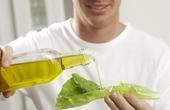How to reduce the intake of saturated fat and cholesterol

Meat.
It is recommended to eat lean pieces of beef, veal, and lamb, such as fillets, shoulder, thigh, lumbar part. In this case, you need to remove all visible fat. Veal contains a small amount of NLC, so it is more preferable. You can also reduce portions of meat to 80-90 g in cooked form. This roughly corresponds to the size of the card deck. In game meat( hare, deer, pheasant) contains less fat than in meat of domestic animals.
It is recommended to cook meat, cook, bake. If the meat is cut into small pieces before cooking, pour cold water and only then put on fire, then you can achieve fat loss of up to 40%.Cooking meat should be on low heat. The first broth when preparing meat soups is recommended to drain, and cook on the second broth. After cooking meat soups, it is recommended to remove all surface fat, after having cooled the soup. It is recommended to reduce the number of ready-to-eat meat products, such as sausages, sausages, etc.
. If possible, completely refuse to eat liver, kidneys and other offal.
Bird and eggs.
Poultry meat contains about the same amount of cholesterol as lean meat, but it has less NLC.It is better to give preference to white meat, which contains less NLC, since the dark meat of the bird contains less iron than in lean red beef meat. The meat of a smaller bird contains less fat.
Turkey meat is considered one of the most lean animal products. The skin from the bird needs to be removed before cooking. It is recommended to limit the amount of egg yolks eaten to 2 per week.
Dairy products.
It is recommended to use dairy products with a low( less than 1%) fat content. In skim milk contains the same amount of protein, calcium and phosphorus, as in whole( fat) milk.
The daily requirement of an organism in calcium( under condition of its sufficient receipt with other products) provides the use of 2 glasses of skim or 1% fat content of milk. This is also a prevention of osteoporosis.
When preparing food, it is recommended to use skim milk or yogurt instead of cream, and low-fat kefir instead of sour cream. It is better to prefer cheeses with low fat content( less than 30%).These are such as "Suluguni", "Adyghe", "Ossetian", "Brynza" from cow milk "Poshekhonsky", as well as Baltic cheeses.
It is not recommended to use cheese as the main source of protein and add it to dishes containing meat. Otherwise, the fat content and caloric content are doubled. It is necessary to take into account the fat content in products, when buying, paying attention to information about its content on the labels.
Fats and oils.
It is advisable to use "hard" margarines( in briquettes) and soft margarines in jars instead of butter. In the case of "soft" margarines, one should pay attention to varieties with a lower content of trans-isomers of LC, choose "soft" margarines - a source of fat-soluble vitamins. Solid margarines contain a large number of saturated fatty acids.
In the diet it is necessary to use vegetable oils rich in linoleic acid( essential PUFAs).These include sunflower, corn and soybean oil. It is inappropriate to use rapeseed and mustard oil as the sole source of vegetable fat, because they have a lower nutritional value.
Refining oils results in the loss of some amount of vitamin E and lecithin, and in unrefined oils, in addition to vitamin E, phospholipids are contained. But, in spite of the above, corn and cottonseed oil are refined without fail. Butter and vegetable oil, like margarines, must be stored in a refrigerator or in a cold dark place to avoid oxidation of PUFA.
In the preparation of salads, preferably use of fat-free mayonnaise, as well as sunflower, soy, olive or linseed oil. For cooking by frying, it is better to use sunflower, rapeseed and olive oil. But the olive oil of cold first pressing is desirable to use for dressing salads.
Materials used:
Shilov VN, Mits'yo VP"Healthy food"
